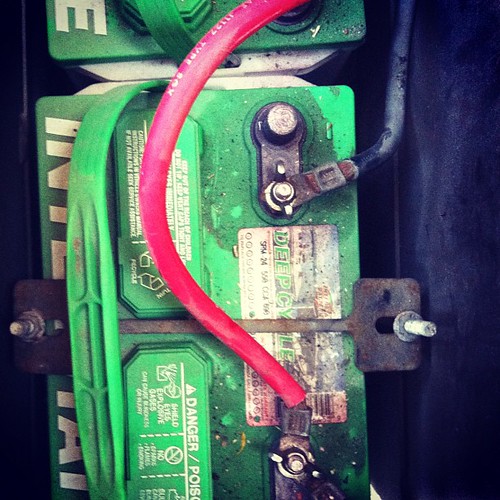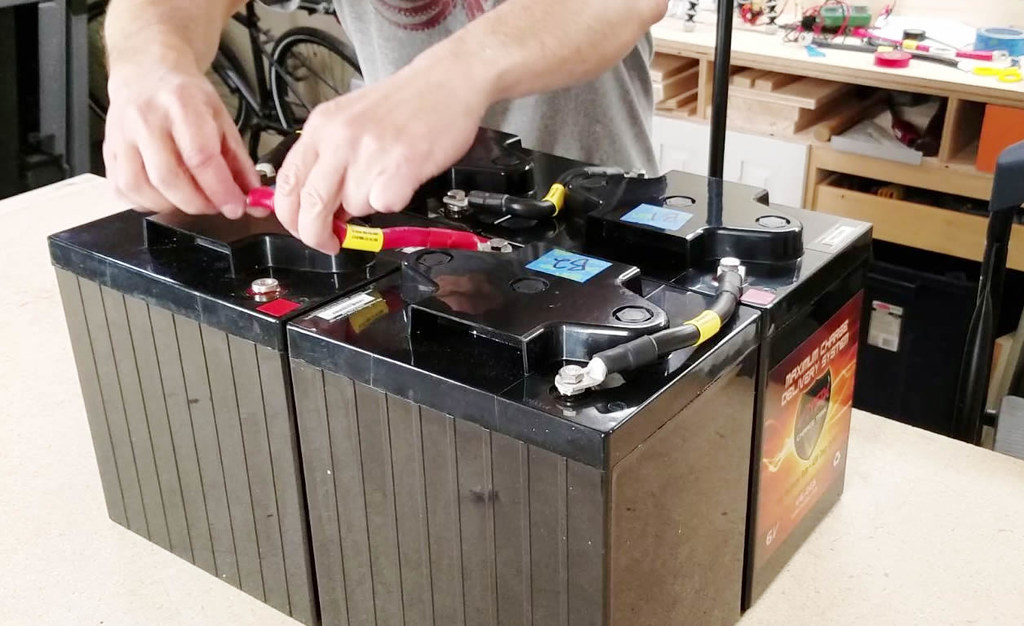So you’re a new RV owner and you want to know how long your battery is going to last, huh? Well, you’ve come to the right place! In this article, we’re going to talk about the average lifespan of an RV battery and provide you with some useful information and tips along the way. Whether you’re planning a long road trip or just need a reliable power source for your adventures, understanding the lifespan of your RV battery is essential. So let’s get started and make sure you’re prepared for all your future travels!

Factors Affecting Lifespan of An RV Battery
Quality of the Battery
The quality of the RV battery plays a significant role in determining its lifespan. Higher-quality batteries are often built with better materials and undergo more rigorous manufacturing processes. These batteries are designed to withstand the demanding conditions of RV usage and provide reliable power for an extended period of time.
Usage Frequency
The frequency with which you use your RV will impact the lifespan of the battery. If you frequently take your RV out for long trips, the battery will go through more charge cycles, which can wear it down over time. On the other hand, if the RV is used infrequently, the battery may deteriorate due to extended periods of inactivity. It is important to strike a balance and find a usage frequency that keeps the battery in good condition.
Charging and Discharging Practices
Proper charging and discharging practices can greatly extend the lifespan of an RV battery. It is essential to invest in a high-quality battery charger that is compatible with your battery type and follow the manufacturer’s guidelines for charging. Overcharging or undercharging the battery can reduce its lifespan. Similarly, avoid discharging the battery completely, as this can cause irreversible damage.
Environmental Conditions
The environmental conditions in which the RV battery is used and stored can affect its longevity. Extreme temperatures, both hot and cold, can negatively impact battery performance and lead to a shorter lifespan. It is advisable to keep the battery protected from direct sunlight and excessive heat or cold to ensure optimal performance and longevity.
Battery Types and Their Lifespan
Lead-Acid Batteries
Lead-acid batteries are commonly used in RVs and have proven to be reliable and cost-effective. These batteries typically have a shorter lifespan compared to other types, but with proper maintenance and care, they can last for several years.
AGM Batteries
AGM (Absorbent Glass Mat) batteries are a popular choice for RV owners due to their improved performance and longer lifespan. AGM batteries are sealed and maintenance-free, making them ideal for RVs. With careful usage and regular maintenance, AGM batteries can last for 5-7 years or even more.
Lithium-Ion Batteries
Lithium-ion batteries are the newest and most advanced type of RV battery. They offer numerous benefits, including longer lifespan, higher energy density, and faster charging times. With proper care, lithium-ion batteries can last up to 10 years or more, making them a worthwhile investment for RV owners.
Average Lifespan of Lead-Acid Batteries
Flooded Lead-Acid Batteries
Flooded lead-acid batteries, also known as wet cell batteries, require regular maintenance and monitoring of electrolyte levels. These batteries have an average lifespan of 3-5 years. Proper maintenance, including checking and topping up electrolyte levels, can help extend their lifespan.
Deep Cycle Lead-Acid Batteries
Deep cycle lead-acid batteries are designed to provide a steady flow of power over an extended period. These batteries have a slightly longer lifespan compared to flooded lead-acid batteries. On average, deep cycle lead-acid batteries can last between 4-7 years with proper maintenance and regular charging.
Average Lifespan of AGM Batteries
AGM batteries, due to their construction and design, offer a longer lifespan compared to lead-acid batteries. With regular charging and proper maintenance, AGM batteries can last between 5-7 years. It is important to follow the manufacturer’s recommendations for charging and maintenance to maximize their longevity.
.
Average Lifespan of Lithium-Ion Batteries
Benefits of Lithium-Ion Batteries
Lithium-ion batteries offer several benefits over traditional lead-acid batteries. They have a significantly longer lifespan, typically lasting between 8-10 years or more. They also have a higher energy density, meaning they can store more power in a smaller, lighter package. Additionally, lithium-ion batteries have a faster charging time, reducing the amount of time spent waiting for the battery to charge.
Average Lifespan of Lithium-Ion Batteries
Lithium-ion batteries have the longest lifespan among all RV battery types. With proper care and usage, these batteries can last up to 10 years or more. However, it is important to note that lithium-ion batteries are more expensive upfront compared to other types of batteries. The longer lifespan and improved performance can offset the initial higher cost for many RV owners.
Signs of a Dying RV Battery
Reduced Capacity
A declining RV battery will exhibit reduced capacity, meaning it won’t hold a charge for as long as it used to. You may notice that the battery drains quickly or fails to power your RV’s appliances as effectively as it did before. If you find yourself needing to recharge the battery more frequently, it could be a sign that it is nearing the end of its lifespan.
Slow Cranking
When starting your RV, pay attention to how quickly the engine cranks. If you notice a sluggish start or the engine takes longer to turn over, it could be an indication that the battery is losing its power and needs to be replaced.
Dimming Lights
Dimming interior or exterior lights can be another sign of a dying RV battery. If your lights appear less bright than usual or flicker, it may be an indication that the battery is no longer providing enough power to sustain them.
Frequent Jump-Starts
If you find yourself needing to jump-start your RV battery more often than usual, it could be a clear sign that the battery is on its way out. While occasional jump-starts may happen due to other factors, frequent reliance on jump-starting indicates that the battery is deteriorating.
Battery Age
The age of the battery is an essential factor to consider when assessing its lifespan. Most RV batteries have a manufacturer-stated lifespan, usually ranging from 3-10 years. If your battery is nearing or has exceeded this range, it is likely time to replace it, regardless of any visible signs of deterioration.
Prolonging RV Battery Lifespan
Proper Charging Practices
To prolong the lifespan of your RV battery, adhere to proper charging practices. Invest in a quality battery charger specifically designed for your battery type and follow the manufacturer’s instructions. Avoid overcharging or undercharging the battery and ensure that it receives a full charge before each use.
Battery Maintenance
Regular maintenance is crucial for maximizing the lifespan of your RV battery. Keep the battery clean and free from corrosion by regularly inspecting and cleaning the terminals. Additionally, check the electrolyte levels of flooded lead-acid batteries and top them up as needed. AGM and lithium-ion batteries are maintenance-free, but it is still important to keep them clean and free from dirt and debris.
Energy Efficiency
Take steps to improve the energy efficiency of your RV, as this directly impacts the battery lifespan. Switch to energy-efficient appliances and LED lighting, which consume less power. Additionally, consider installing a solar power system or generator to reduce the load on the battery and extend its lifespan.
Storage Considerations
Proper storage is crucial when the RV is not in use for an extended period. If possible, store the RV in a temperature-controlled environment to prevent extreme temperature fluctuations. Disconnect the battery or use a battery maintainer to ensure it remains in good condition during storage.
Replacing an RV Battery
When to Replace
Knowing when to replace an RV battery is important to avoid unexpected power failures. If you notice any of the signs mentioned earlier, or if the battery is approaching its manufacturer-stated lifespan, it is time to consider a replacement. It is better to replace the battery proactively rather than risk being stranded without power.
Choosing a New Battery
When selecting a new RV battery, consider factors such as battery type, capacity, and compatibility with your RV. Determine the power requirements of your RV and choose a battery that can meet those needs adequately. Consult with an expert or refer to your RV’s owner manual for guidance on selecting the right battery for your specific model.
Reputable Brands
Opt for batteries from reputable brands known for producing reliable and high-quality products. Popular brands in the RV battery industry include Trojan, Interstate, Optima, and Battle Born. Research customer reviews and seek recommendations from experienced RV owners to make an informed decision.
Battery Installation
Installing a new RV battery can be a straightforward process, but it is essential to follow the manufacturer’s instructions and safety guidelines. Ensure that the battery is securely mounted in the battery compartment and that the terminals are properly connected. If you are unsure or uncomfortable with the installation process, consult a professional to ensure it is done correctly.

Costs of RV Batteries
Price Range
The cost of RV batteries can vary depending on the type, capacity, and brand. Lead-acid batteries are generally more affordable, with prices ranging from $100 to $300. AGM batteries are a mid-range option, typically costing between $200 and $500. Lithium-ion batteries, while more expensive upfront, can range from $800 to $2000.
Long-Term Cost Considerations
While lithium-ion batteries may have a higher upfront cost, they offer significant long-term cost savings. With a longer lifespan and improved performance, the need for frequent battery replacements is minimized. Additionally, the higher energy density of lithium-ion batteries allows for more efficient charging and use of power, potentially reducing energy costs in the long run.
RV Battery FAQs
How long does it take to charge an RV battery?
The charging time for an RV battery depends on the battery type, capacity, and the charging method used. On average, it can take anywhere from a few hours to overnight to fully charge an RV battery. Lithium-ion batteries generally have a faster charging time compared to lead-acid batteries.
How can I extend the lifespan of my RV battery?
To extend the lifespan of your RV battery, follow proper charging practices, maintain the battery regularly, prioritize energy efficiency, and store the battery correctly when not in use. Avoid overcharging, undercharging, and discharging the battery completely, as these practices can shorten its lifespan.
Can I use solar panels to charge my RV battery?
Yes, solar panels can be used to charge RV batteries. Solar power is a clean and sustainable energy source that can help reduce reliance on shore power or generators. When using solar panels, it is important to ensure that they are properly sized to meet the energy demands of your RV and that they are compatible with your battery type.
Can I replace my RV battery with a different type?
In most cases, you can replace your RV battery with a different type, as long as it is compatible with your RV’s electrical system and charging system. However, it is important to consider the specific requirements and considerations of each battery type before making the switch. Consult with an expert or refer to your RV’s owner manual for guidance if you are unsure.

